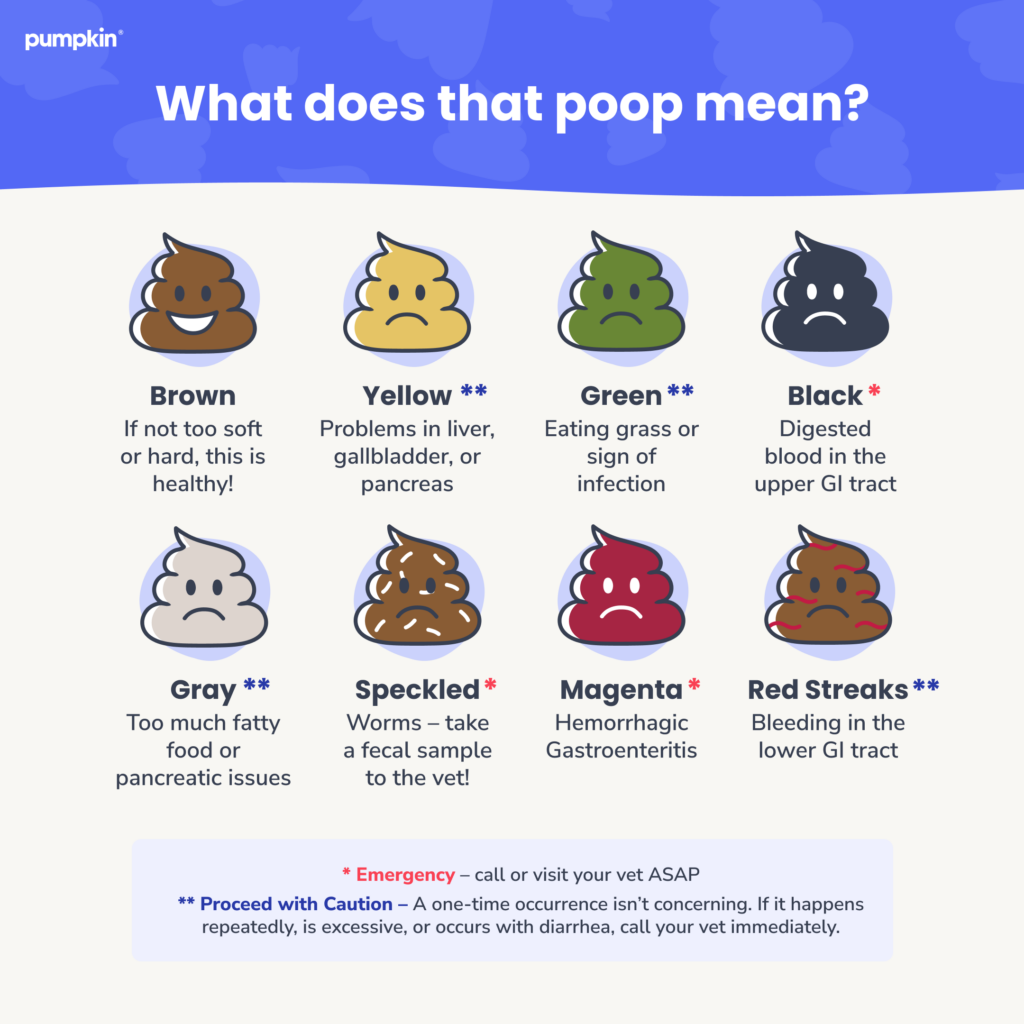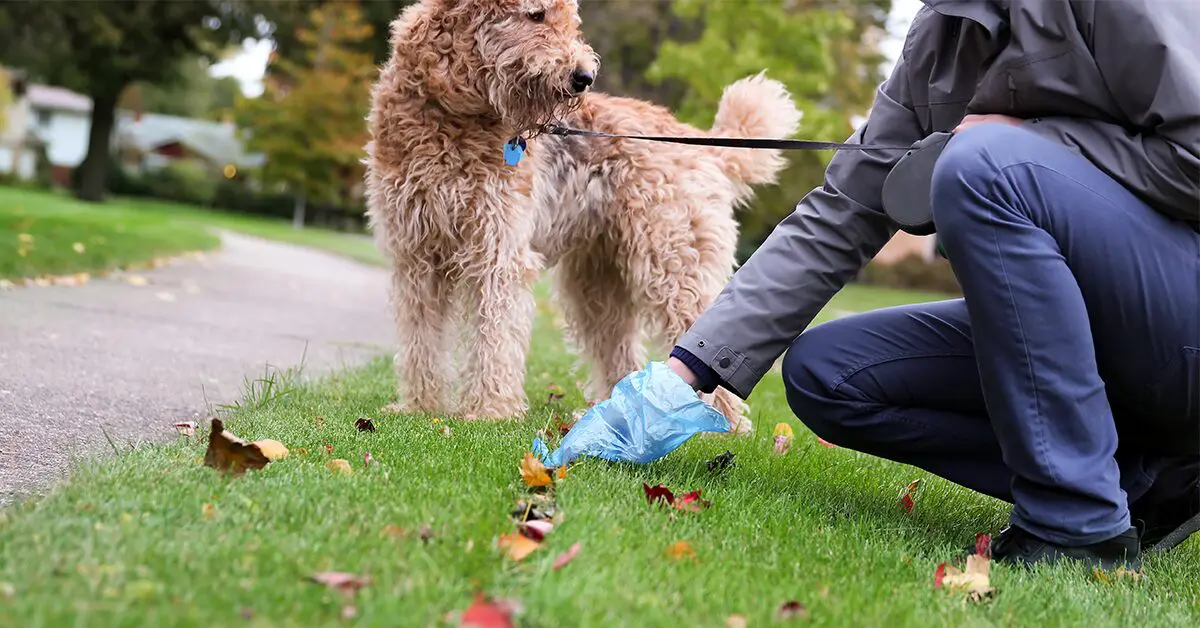Key Points
- A little bit of red blood in your dog’s stool isn’t necessarily a cause for alarm, but if you notice bleeding that occurs with vomiting, serious diarrhea, or lethargy, then reach out to your vet.
- Black and tarry blood in stool is called melena, a sign that your pet is digesting blood; if you suspect melena, you should contact your veterinarian immediately.
- When you spot blood in your dog’s poop, take a picture or keep a sample to share with your veterinarian. They may recommend parasite testing, X-rays, endoscopy, or blood or fecal testing.
If you’ve found blood in your dog’s poop, don’t panic — but don’t ignore it either.
A dog pooping blood is actually quite common and sometimes just a fluke. (Think occasional red streaks in the stool, not something from out of a horror movie.) Blood in your dog’s stool could be caused by something mild and treatable or something serious that requires an ER visit. The difference usually lies in the amount of blood, the color of the blood, and any accompanying symptoms.
When is blood in dog poop an emergency?
If your dog is pooping large amounts of blood, vomiting, having constant bloody diarrhea, or appears lethargic, you should take them to the nearest emergency vet right away. If your dog has pooped a small amount of blood and is otherwise acting perfectly normal, a call to your primary vet should suffice.
In either case, it’s always a good idea to:
- Take a picture of your dog’s poop
- Keep a stool sample
- Take note of whether it’s bright red or black, tarry blood
- Take note of any other unusual symptoms
If you can’t get a sample or picture, don’t stress — just do your best to describe the color of the poop and any unusual symptoms to your vet. They’ll be able to decide the best course of action.
What does blood in dog poop look like?
Sometimes, it can be hard to tell if you’re looking at blood or simply a discolored poop. There are two kinds of blood you will typically see in a dog’s stool: bright red blood or black, tarry blood.

Bright red blood in dog poop
If you see bright red blood in your dog’s stool, this is called hematochezia. You may notice it on the surface of your dog’s poop. It’s common for this type of blood to be present on both fully formed stools or loose stools.
The bright red color indicates the blood has not traveled very far through the body and is undigested, giving it that bright red color. This type of bleeding usually begins in the rectum, colon, or anus. Hematochezia can have several possible causes.
Black or tarry blood in dog poop
If you notice black or tarry blood in your dog’s stool, this is called melena. This blood is coming from higher in the dog’s digestive tract and has been digested. There are many possible causes for this as well.
With melena, your dog’s stool may resemble coffee grounds. The blood could originate from the lungs, pharynx, esophagus, stomach, or upper small intestines. Because it travels further through the digestive system, it gets digested, making it look almost black.
Your dog may poop in greater volume in cases of melena. If you’re not sure you’re seeing blood, try wiping some of the stool on a white paper towel. The redder pigments will then be visible.
If you suspect your dog is showing signs of melena, you should contact your veterinarian immediately.
Common causes of bright red blood
Parvovirus
Parvovirus is a common cause of bloody diarrhea and bloody stools in puppies. Symptoms may include vomiting, diarrhea, loss of appetite, blood in the stools, and lethargy. If you suspect your dog has contracted parvovirus, see your vet immediately as it can be life-threatening.
Parasites
Intestinal parasites or worms in dogs can also cause blood in stool. These can include hookworms, whipworms, roundworms, tapeworms, giardia, and coccidia (protozoans). A regular parasite prevention program can eliminate them. To diagnose parasites, your veterinarian may examine your dog’s stools so they can prescribe specific anti-parasitic medication.
Rectal injuries and intestinal blockages
Dogs love to ingest anything that looks tasty to them. This can get them into trouble and cause irritations of the colon, punctures of the intestinal walls, intestinal blockages, diarrhea, and thus, bloody stools. The fresh blood will be bright red and should stop after the object passes. If the problem persists, they may have an internal injury or intestinal blockage.
If you know that your dog has recently swallowed a chicken bone or something else they shouldn’t have, then blood in their stool should be a major cause for concern. Talk to your vet about potential treatment options, including surgery to remove the foreign object or blockage.
Anal gland problems
Dogs have two scent glands located on either side of their anus, and inflammation or abscesses can result in hematochezia.
Tumors
Colonic, rectal, anal, or anal gland tumors that bleed can also cause hematochezia.
Hemorrhagic gastroenteritis
While not technically hematochezia, hemorrhagic gastroenteritis (HGE ) is sudden, severe bloody diarrhea. The cause is unknown but may be bacterial. If you notice this kind of diarrhea in your dog, call a veterinarian immediately for assistance, as this condition can be fatal.
Inflammation
Inflammatory bowel disease and severe colitis can also cause hematochezia.
Common causes of black or tarry blood
Ingesting toxins
Ingesting toxins like antifreeze or rat poison can cause melena. Also, toxic foods such as grapes, onions, and garlic can send your dog into a medical emergency with black, tarry poop or bloody diarrhea. Lastly, spoiled food can cause indigestion and bloody stool.
Ingesting blood
If your dog licks a bloody injury, has a dental disease that causes bleeding in their mouth, or even swallows the blood from a nosebleed, then their stools will show signs of digested blood. Watch out for coffee-ground-looking poop when your dog has a bowel movement.
Blood clotting disorders
Disorders that slow down the clotting of your dog’s blood can range from inherited disorders to acquired disorders. The ingestion of rat poison can also cause a clotting disorder and bleeding.
NSAIDs
Anti-inflammatory drugs can cause ulcers in your dog’s stomach, which can bleed into the digestive system. Your vet will monitor your dog’s health while on these medications, but you should also monitor their feces for signs of blood. You’ll want to catch any bleeding from NSAIDs early.
Post-surgery complications
Anytime your dog has undergone surgery and there is blood in their stool, contact your vet right away. It could be a sign of internal bleeding.
Tumors or cancer
We never want to think about these, but they happen and can cause melena in your dog’s stools.
Pepto-Bismol
Used to treat diarrhea, Pepto-Bismol may turn your dog’s stool black temporarily. It will return to normal when the medication is completed. It can also cause gastric bleeding, so it should only be given to your dog if your veterinarian recommends it.
How do you treat blood in dog stool?
The treatment your dog needs will depend on the underlying cause of the bloody stool. Your vet will probably begin with a simple physical examination and medical history review. If you’ve taken photos of the bloody stool (or brought a sample), your vet will examine this as well.
If the cause is still unclear, your dog may need further examinations and diagnostic tests and examinations. Your veterinarian might recommend:
- Parasite tests to rule out worms or giardia
- Blood work to rule out anemia, infections, and platelet counts that may affect blood clotting ability
- Metabolic or chemistry screening to check liver and kidney function
- X-rays to look for foreign bodies in the digestive system and blockages
- Ultrasound to look for tumors, check organs, or check for injuries
- Endoscopy to examine the upper GI tract
- Colonoscopy to examine the lower digestive tract
- A fecal occult blood test
For less serious medical issues, your vet may recommend simple treatments such as extra fluids for dehydration, anti-parasitic medication, diarrhea medication, or changes to their diet. Probiotics and vitamin injections (particularly Vitamin B12) can also help soothe a sick pup’s digestive system.
When your veterinarian diagnoses a more serious cause of bleeding, they will discuss the next steps with you. If a foreign object like a chew toy or chicken bone has become lodged in their intestines, surgery may be required. Sometimes, this is the only way to remove an object that your dog has swallowed. If tumors or inflammatory bowel disease are the culprit, then your vet will work with you on long-term treatment plans to resolve the problem. And if your dog is in pain from any of these medical problems, pain medication can help ease your dog’s discomfort.
Other medications might be prescribed depending on the cause. For instance, steroids can be used to help the gut calm down and reduce inflammation. For stomach ulcers, acid reducers can be used to treat the ulcers, vomiting, and diseases that cause hyperacidity.
Other causes of blood in dog stool:
Bloody stool could be caused by something as simple as stress. Unfortunately, many serious health problems also cause bleeding. Here are some other potential causes to know:
Eating foreign objects
This is one of the most common dog accidents pet parents face. Lots of dogs like to chow down on foreign bodies like toys, cooked bones with sharp edges, rocks, sticks, socks or towels, and garbage. These items can cause pancreatitis as well as more serious conditions like intestinal blockages, which will require surgical removal.
Rectal polyps and hemorrhoids
These growths may be visible if they protrude from the anus. You could also find blood on or near your dog’s bum. The surface of polyps and hemorrhoids bleed easily but also stop quickly.
Dietary changes
Food allergies, intolerances, or changing to a new food too quickly can all cause dog diarrhea or blood in the stool. Always check with your vet to make sure you are transitioning from one food to the other in an appropriate amount of time to protect your dog’s digestive system.
Impacted or infected anal glands
Anal gland problems usually cause a dog to lick excessively ‘back there’ or scoot their butt, often signaling they need their anal glands expressed. When you’re done cleaning blood or poop from your carpets, call your vet.
Stress
Extreme stress can also cause bloody stool. Common causes of extreme stress include fireworks, moving, or a new pet or person joining the family. In nervous pups, these events can all cause colitis — bloody diarrhea, sometimes with mucus.
Bacterial infections
Salmonella and E.Coli are a few of the bacterial infections that can cause bloody diarrhea and blood in your dog’s stools. These bugs are also contagious to humans, so be careful! Thoroughly wash your hands when touching dogs with these infections.
Inflammatory Bowel Disease (IBD)
IBD is a chronic disease of the intestinal tract. When inflammation is caught early, it will produce bright red blood. If left untreated, the blood can become dark red.
Pancreatitis
The pancreas sends enzymes into the small intestines. When a dog has pancreatitis, the small intestines become inflamed and infection sets in, causing vomiting and serious diarrhea, which may contain mucus and show signs of blood.
As you can see, there are many reasons your dog could have blood in their stool. Talking to your vet can help you determine the underlying cause and how to move forward with any necessary treatment. You should also consider getting pet insurance before your dog needs emergency veterinary care. Being proactive not only helps you stay on top of your dog’s health, but it also gives them the best prognosis possible if they get sick or hurt.
FAQ
- https://vcahospitals.com/know-your-pet/hemorrhagic-gastroenteritis-in-dogs
- https://wagwalking.com/condition/hematochezia
- https://www.petplace.com/article/dogs/pet-health/melena-blood-in-stool-in-dogs
- https://vcahospitals.com/know-your-pet/inflammatory-bowel-disease-in-dogs
- https://vcahospitals.com/know-your-pet/fecal-occult-blood




